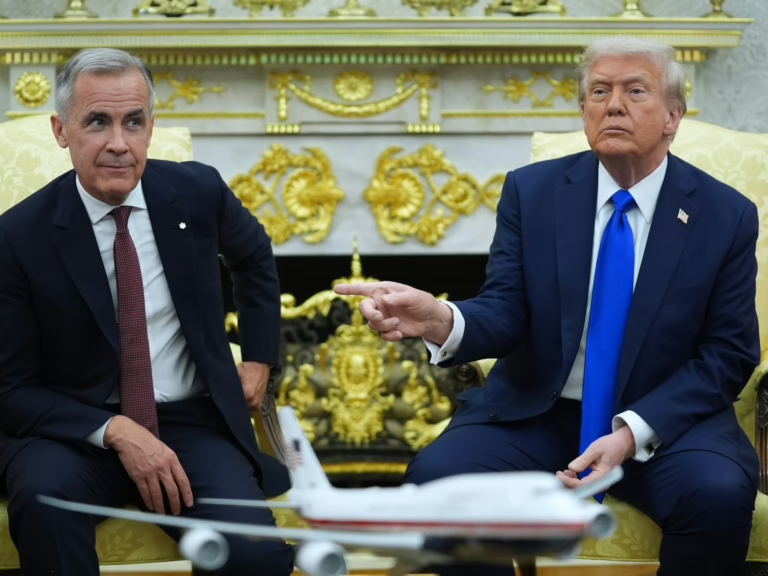Mark Carney, Canada’s Prime Minister, has returned to the White House for the second time within five months amid mounting pressure to resolve the ongoing US tariffs on steel, automobiles, and other Canadian exports that are impacting the nation’s economy.
On Tuesday, Carney held discussions with US President Donald Trump at the White House.
President Trump expressed a positive rapport with Carney, stating, “From the outset, I liked him, and we’ve maintained a strong relationship.” Sitting beside Carney in the Oval Office, Trump acknowledged the natural tensions between the two countries but emphasized their mutual respect and affection.
He indicated that their talks would cover tariffs, including the possibility of reducing duties on vital Canadian industries as part of efforts to ease trade frictions between the two neighbors.
Given that over 77% of Canada’s exports are destined for the US market, these discussions carry significant economic weight.
While Canadian officials and analysts remain cautious about the likelihood of an immediate trade agreement, they view the continuation of dialogue itself as a positive outcome for Carney.
Key issues on the agenda include trade relations and the United States-Mexico-Canada Agreement (USMCA), a cornerstone of Canada’s economy, which is scheduled for review next year.
Trump expressed openness to revisiting the USMCA, which was implemented during his first term, or exploring alternative trade arrangements.
“We could renegotiate it, which might be beneficial, or pursue different agreements,” Trump remarked. “We have the flexibility to do so.”
Trump’s admiration for Carney was evident, contrasting with his previous stance toward Carney’s predecessor, Justin Trudeau. He praised Carney as a “world-class leader” and acknowledged his strong negotiating skills.
During Carney’s last Oval Office visit in May, he firmly rejected Trump’s repeated suggestions of purchasing or annexing Canada, asserting that the country is not for sale.
Since then, Carney has made several concessions to the US, including removing certain retaliatory tariffs and abandoning a digital services tax targeting American technology firms.
Carney’s team has indicated that this working visit aims to establish a renewed economic and security partnership with the United States.
“Where competition exists, we must reach agreements that are mutually beneficial,” Carney stated.
White House spokesperson Karoline Leavitt confirmed on Monday that trade and other bilateral issues would be central to the discussions.
Although most Canadian exports enter the US tariff-free under the USMCA, tariffs have severely affected Canada’s steel, aluminum, automotive sectors, and numerous small businesses.
Jonathan Kalles, a former advisor to Trudeau, noted, “Currently, Canadian goods face some of the lowest tariff rates. It’s wise not to provoke further conflict when the situation could deteriorate.” He added that meetings with Trump always involve strategic risks.
“Carney is likely to secure better outcomes through discreet negotiations rather than public displays at the White House,” Kalles observed.
Mounting Pressure
Carney secured his election victory in April with a promise to adopt a firm stance toward Trump and to forge a new economic framework with the US.
Shachi Kurl, president of the Angus Reid Institute, highlighted that public opinion polls suggest Canadians have generally been patient with Carney’s handling of US relations.
“However, this patience has limits,” Kurl warned, pointing to rising unemployment and slowed economic growth caused by US tariffs as factors that could intensify public demand for results.
Opposition leader Pierre Poilievre criticized Carney’s strategy, referencing the prime minister‘s earlier commitment to “negotiate a win” by July 21. Poilievre expressed skepticism about the effectiveness of the current trip.
In response, Dominic LeBlanc, Canada’s minister responsible for US trade, emphasized that challenges remain regarding sector-specific tariffs.
“Is the opposition suggesting that when the US president invites us for a meeting and working lunch in Washington, we should have declined and ended communication?” LeBlanc questioned in Parliament.
Asa McKercher, an expert on Canada-US relations at St. Francis Xavier University, stated that the meeting would be deemed successful if it acknowledges Canada’s efforts to address Trump’s longstanding concerns.
“Carney has recently established a new defense agency and increased military spending. It would be a positive step if Trump responded by easing tariffs on the automotive sector,” McKercher noted, referencing Trump’s previous criticism of Canada as a “military free rider.”






















